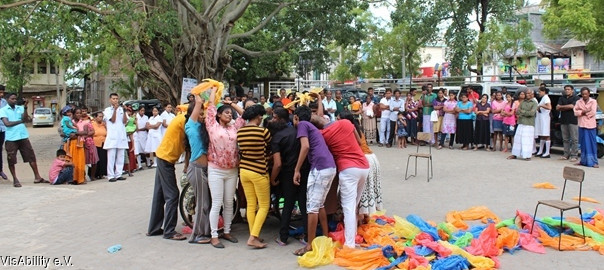Our project in the District of Polonnaruwa (North Central Province) took place in Polonnaruwa and Kaduruwela (Polonnaruwa New Town). We ran our workshops at the temple Jayanthi Viharaya, which sparked much interest – especially among the young monks, who curiously observed the participants of the mixed-abled dance workshop and quickly engaged with us.
Participants with and without disabilities arrived from remote, isolated areas. Those who could not travel by themselves – in particular people with disabilities, who were partially accompanied by a family member – were picked up by our team members with the help of a District Social Welfare Officer. Others arrived by themselves, like Nalaka, a 30 year old man who made a two hour journey on his tricycle. In order to facilitate the attendance of these people at our workshops, VisAbility provided accommodation close by. Some parents and other family members only came for the first day, to ensure that their relatives settled down. One of our local coordinators remained with the group for the period of our five-day program. For some people with disabilities, it was the first time they had stood alone without any family member. Initial reservations on their part changed into a good team spirit within a short period of time.
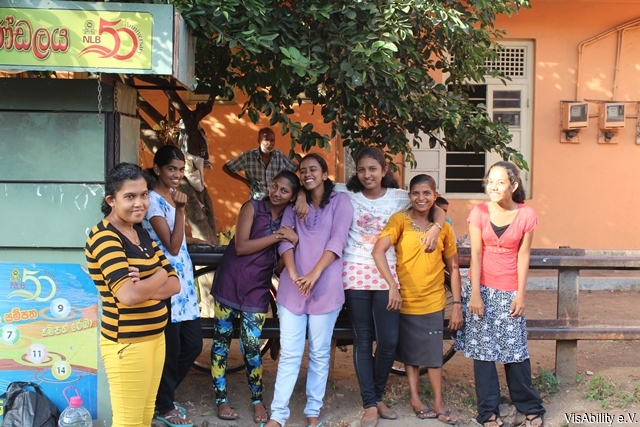
Advocacy and research
Our work in Polonnaruwa started with a press conference at the temple Jayanthi Viharaya to present the aim of our project. The journalists showed a keen interest, and several articles were published in the newspapers afterwards. In advance of the upcoming Sri Lankan Parliamentarian elections (17 August 2015), we took the opportunity to call on the parties to better promote the mainstreaming of people with disabilities into every level of society, as well as to enforce and improve mechanisms in place.
School dropouts
Furthermore, Helena-Ulrike Marambio and Nirma Karunarathna inquired with the authorities into the matter of school dropouts as a result of both the rejection of people with disabilities by teachers and parents of “normal” pupils and the lack of special need classes in several parts of each district. In one case – that of a family with two disabled school droppers from Anuradhapura, the place of our first project – VisAbility took action in coordination with the parents. In addition, Helena and Nirma interviewed a teacher of a special need class in Polonnaruwa, who shared his challenges to run a proper school class. The main difficulty he raised included the lack of a monthly student allowance of 750 LKR (approx. 5 Euros) to allow pupils with disabilities to take public transportation to school from remote, isolated areas.
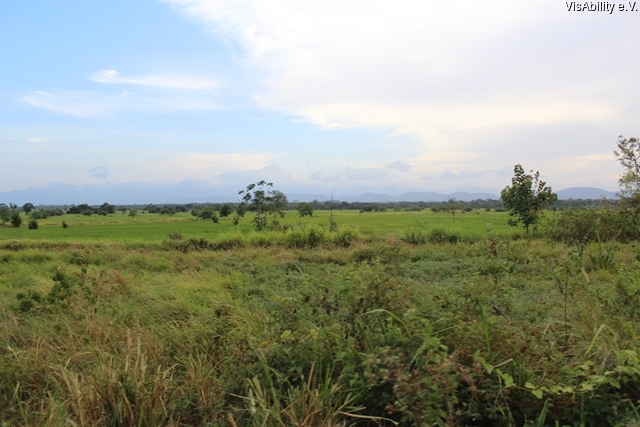
Parents, the teacher explained, are not able to pay for transport every day, especially the parents of children who need to be accompanied to school. Consequently, many pupils miss several classes during the week, a situation which makes solid school teaching almost impossible. The teacher tried to facilitate his pupils’ obtaining of allowances by distributing and collecting application forms to and from their parents, subsequently submitting the forms, in January 2015, to the Divisional Secretariat, but these applications have yet to receive a reply.
Social Welfare System
In our interviews and conversations, we learned about gaps in communication, coordination and exchange of knowledge and experience between the central governmental and provincial social welfare officers. In addition, there appears to be a clash in terms of daily assignments of tasks for one officer, who is subordinated under different bodies simultaneously. As a consequence, because officers stick to desk work, required field visits have to be suspended. This negatively affects the ability both of the officers to provide services and of the people in need to receive it. It also affects the welfare system in terms of monitoring and control. Moreover, records of allowances and statistical data are underdeveloped because current guidelines seem to be too complex rather than accessible. The officers VisAbility spoke to expressed the need for further training on methods for the empowerment of people with disabilities, in particular innovative means. Additionally, they supported the idea of training paralegals for disability rights in different districts.
Mixed-Abled Dance Workshop
The group of participants was very diverse. Nevertheless, as the choreographer Mahesh Umagiliya highlights, each individual with and without disabilities went through a significant development process: At the beginning, some youngsters without disabilities thought that their dance partner with disabilities “destroyed” the scene due to his/ her perceived limitations. However, over time, they learned not to stereotype people with disabilities, but to adjust their personal behavior and movements according to the ability of their counterpart. Some of them expressed that they would have never imagined becoming friends with the “other” person.
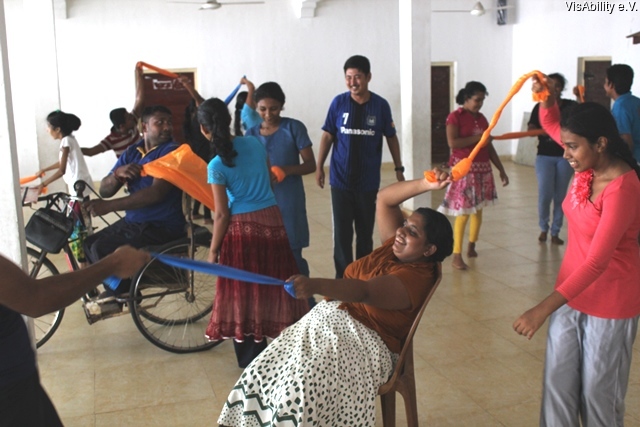
Kamal Janaka Rathnayaka, the local coordinator, explains: “When it comes to the empowerment of people with disabilities, it is very important to address both sides – people with and without disabilities – at the same time. Mixing people supports inclusion. People with disabilities need a society that understands how to uncover abilities of different people in order to benefit properly from each other.” Dinesh Prema Kumara, a young blind man who is acting as second local coordinator in Polonnaruwa, adds: “We need to grow by ourselves. People with disabilities have to think outside the box. We can do much more than we think and are told and taught.” This statement underpins many positive development examples of the participants. Nirmala, a young woman living in the jungle, arrived walking with a big stick and was not able to do much without assistance. On her return home after the end of the workshop, she realized that she had forgotten her stick at the accommodation in Polonnaruwa. In a phone call we received some days later, she said that she tries her best to keep on walking without any help and do her personal things by herself.
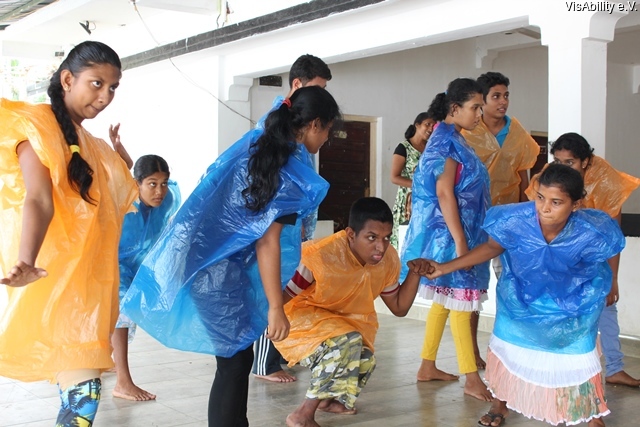
Another positive example is Sandun, who joined the mixed-abled dance workshop on the second day due to a visit of a volunteer from Japan, Toshi, currently helping out in the Sri Lankan social welfare system. He also took part in the workshops. Inspired by the project, he went to 50 houses to find people with disabilities who may be interested in coming, too. Sandun was one of the individuals to whom he talked. The young boy suffers from a half-side paralyzed body due to an accident last year. In the months since the accident, seeing for himself no positive future, he experienced severe depression. He also rejected the option of physiotherapy. His family had to push him to join us. The day after, his mother told us that Sandun came home and said: “Now I realize that there are other people in the world who have much more challenges than me”, and started get a positive attitude.
Public Performance
On the fourth day, the participants presented their developed dance piece at the main road during the rush hour in Kaduruwela, in front of the Polonnaruwa Railway Station. Within a few moments, the performance attracted much attention, causing a traffic jam as people stopped their motorbikes, three-wheelers and cars. Others took pictures or filmed from passing buses and cars.
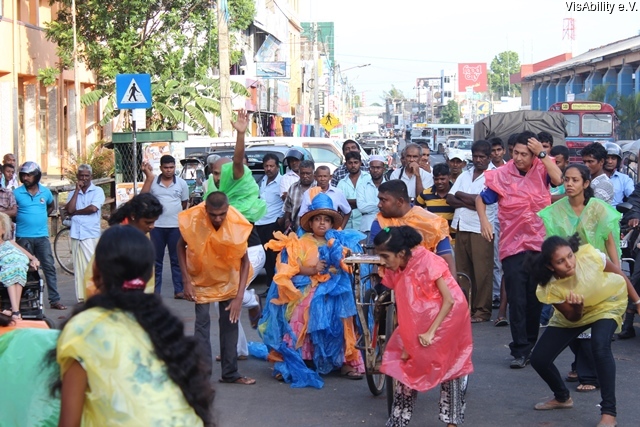
On the fifth day, after the end of the Disability Rights Workshop, the performance took place at the District General Hospital, Polonnaruwa. Thanks to the Director, we were allowed to use the entrance space at the beginning of afternoon visiting time. Again, we had a big audience of approximately 150 people (staff of the hospital, visitors and people passing by). One doctor recognized Sandun, slapped his hand against his head and said: “You are not coming to the physiotherapy, but you dance?” Actually, Sandun drove his family and friends home in a three-wheeler with a great smile.
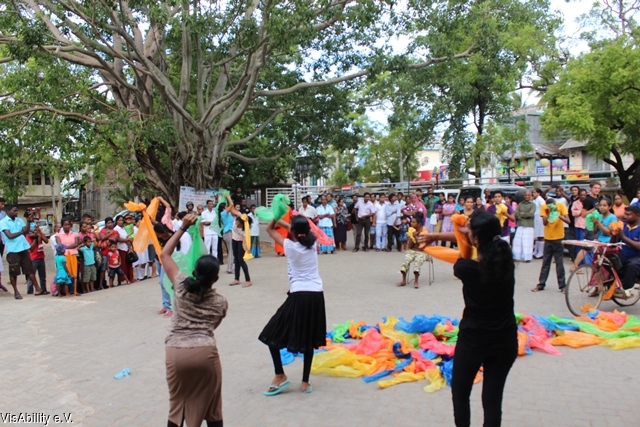
Disability Rights Workshop
The workshop on Disability Rights brought together people with disabilities, parents and social welfare officers from seven divisions of the District of Polonnaruwa. The workshop aimed at transmitting the message that diversity is not bad, but a benefit because diverse people can contribute to the society with different abilities. Moreover, being “different” does not mean that an individual does not have power to speak up, be listened to, and do what he or she likes to do. It is only a question of how to facilitate people in reaching these goals.
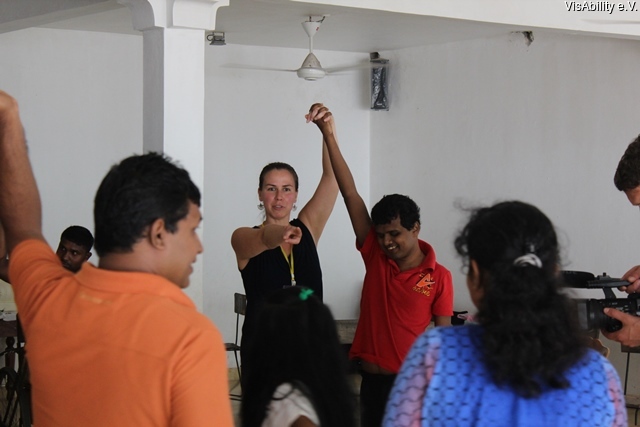
In a second session, participants were informed about international and national rights of people with disabilities in Sri Lanka, as well as programs and courses offered by the Social Welfare System. Two officers provided information on allowances for people with disabilities, vocational training and other related programs. They also had to face questions from those participants who have been waiting for several months for replies on their allowance applications. The last block of the workshop was divided into two groups: firstly, parents and people with disabilities; secondly, social welfare officers. The first group had to identify community needs and develop self-help solutions.
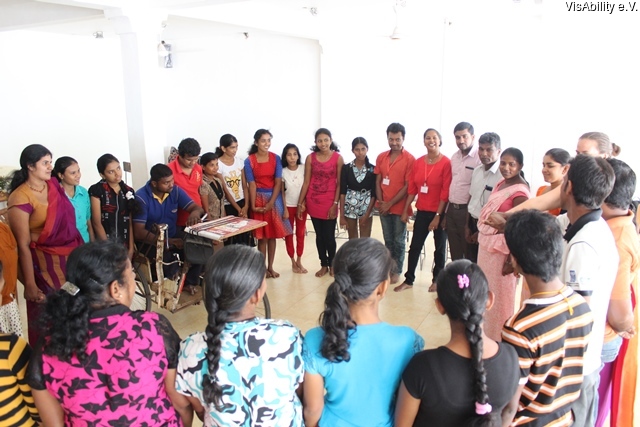
In a small group, the officers received the opportunity to talk about their daily challenges in the office. One officer admitted: “I like to serve to the people, but there are several obstacles to do so well.”
Both workshops ended with the submission of the certificates to the participants after the second performance at the District General Hospital Polonnaruwa.
